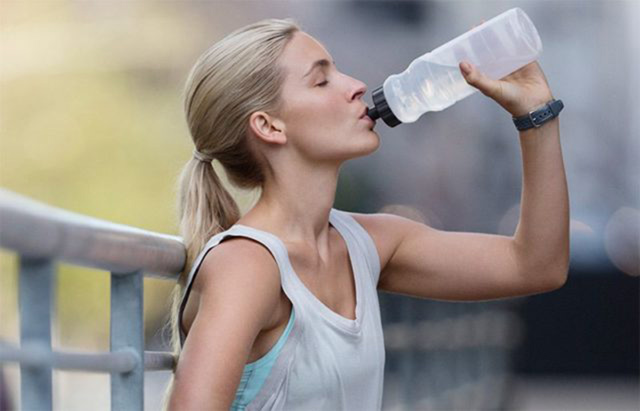By Jesus Jimenez
If you wait until you’re thirsty, it’s too late.
Thirst is just one symptom of dehydration, but you shouldn’t wait until you’re parched to drink water, according to Alison Harris, a nurse for on-demand healthcare provider DispatchHealth.
Although staying adequately hydrated is something to be mindful of all year long, it should be especially top of mind in the summer, Harris said.
From June 1 through July 15, MedStar Mobile Healthcare has treated 224 patients suffering from a heat-related illness in the Fort Worth area alone, said Matt Zavadsky, a spokesman for the ambulance service. Of those cases, 53 involved patients whose primary problem was dehydration.
Staying hydrated:
— There’s more to dehydration than you might think.
In addition to increased thirst, dehydration has other common symptoms including dark urine, dry skin, headaches and muscle cramps, Harris said.
Other times, however, the symptoms could be confused for something other than dehydration, according to Harris.
“Sometimes it’s a very vague symptom,” she said. These ambiguous symptoms include feeling sleepy, tired, irritable or confused.
In severe but rare cases, symptoms of dehydration can include convulsions and even delirium, according to Harris.
“Those are the ones that happen quickly.”
— It can take time for dehydration to settle in.
After spending time outside on a hot day, it might seem obvious to get a drink, but it might take longer for dehydration to settle in.
In some cases, dehydration can happen hours or even days later, Harris said.
“Your body is great at compensating until it can’t,” Harris said. This is why experts recommend hydrating days before strenuous activity, such as a marathon, and not waiting until the day of.
— It doesn’t need to be hot outside for someone to become dehydrated.
The summer heat plays a role in dehydration, but it doesn’t take triple-digit temperatures to reach a breaking point.
Other weather conditions — such as humidity levels and dew points also play a role in how much someone sweats.
When it’s muggy outside and humidity and dew points are high, someone might sweat more even if temperatures are relatively mild.
In March 2018, during the Rock ‘n’ Roll Dallas Half Marathon, two runners collapsed because of heat exhaustion. Temperatures that morning were only in the 20ºsC, but humidity levels were much higher.
Dew points — a measure of water vapour in the air — are also another weather condition to consider when being outdoors for several hours.
Once dew points reach 15ºC, conditions will feel slightly muggy. When dew points reach 21º to 24ºC, the air feels thick and oppressive, according to the National Weather Service.
“Make sure you’re listening to your body,” Harris said. “Make sure you’re not afraid to get help.”
— There’s no magic number on the amount of water to drink.
When it comes to how much water someone should drink per day, experts often cite the rule: eight 250-ml glasses per day. That’s a good general rule to follow, Harris said, but everybody is different, so some people might need more and others less.
Other experts recommend measuring daily water intake based on weight. That’s another solid rule, but Harris said it doesn’t account for other factors, such as how many minutes someone exercises per day, what climate that person lives in and how much caffeine or alcohol that person consumes in a day.
Caffeine and alcohol are diuretics, which cause people to lose fluids, Harris said.
“Even if you’re drinking a lot, it comes right back out,” she said.
— It takes more than just water to stay hydrated.
Water is great for staying hydrated, but that’s not all the body needs, Harris said. To stay optimally hydrated, the body needs a mix of water and electrolytes.
“It’s all about balance,” she said.
If they’re not doing so already, anyone who exercises regularly in the heat or spends several hours outdoors should consider drinking sports drinks to replace electrolytes lost through sweat, Harris said.
Prevent heat-related illness:
— Hydrate: Drink plenty of water during the day, especially if you are engaged in any strenuous activity. Sports drinks are a good choice if you’re exercising or working in hot conditions, but water is a good way to hydrate as well.
— Ventilate: Stay in a place where there is plenty of air circulating to keep your body cool. If you are indoors and don’t have access to air conditioning, open windows and use a fan.
— Cover up: Wear light-coloured and loose-fitting clothing to avoid absorbing the sun’s light and trapping heat. Wear a hat to shield yourself from the sun, but once you feel yourself getting warm, remove any items covering your head that can trap heat close to your body.
— Limit activity: Heatstroke can occur in less than an hour when you are participating in strenuous activity during a hot day. If you feel yourself getting hot or lightheaded, stop your activity and rest in a cool place out of the sun. Be sure to drink water or a sports drink before, during and after any strenuous activity.
— Check on loved ones: The elderly are especially vulnerable to heat-related emergencies. Many elderly residents are not aware of how hot it may get in their residence. Call on older friends and family members regularly to assure they are doing OK.
